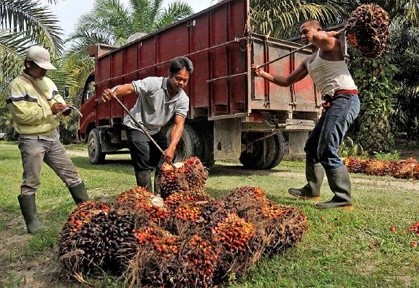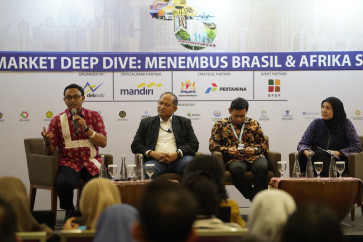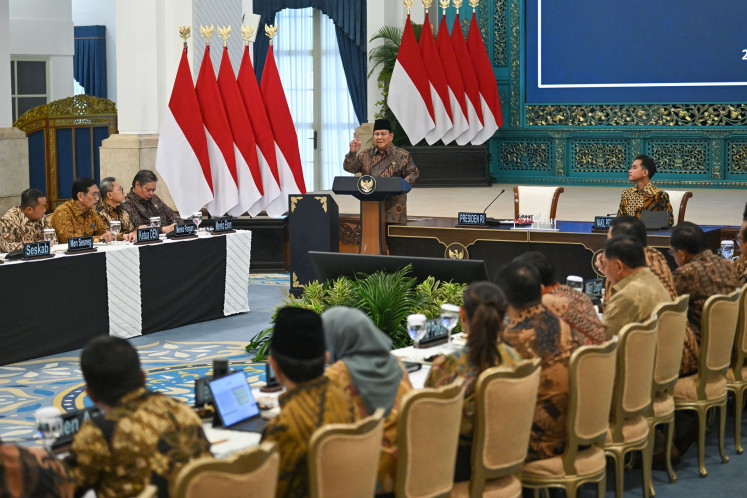Popular Reads
Top Results
Can't find what you're looking for?
View all search resultsPopular Reads
Top Results
Can't find what you're looking for?
View all search resultsPowerful lobby sought to ease Indonesia palm oil exports
Change text size
Gift Premium Articles
to Anyone
W
ith the absence of a special lobby group to promote their collective interests overseas, local crude palm oil (CPO) producers have set a moderate growth target for the commodity’s export this year.
The Indonesian Palm Oil Producers Association (Gapki) expects to increase exports by 7.56 percent to 27 million tons this year from 25.1 million tons in 2016, while production will likely increase by 12 percent to 38.7 million tons in the world’s biggest producer of the commodity.
Exports in 2016 dropped 5 percent from 25.1 million tons in 2015, which the association mainly attributed to the absence of special trade deals and a special body to intensify marketing efforts amid competition with Malaysia, the world’s second largest CPO -producing country.
Local producers have also been introduced to the government’s mandatory biodiesel mix policy, in which CPO is used as a mix in biodiesel in the local market.
“Exports in 2016 dropped slightly due to various factors, but we expect it to be temporary. We set a sober target for exports this year as we expect challenges to remain more or less the same,” GAPKI secretary-general Togar Sitanggang said at a press conference on Tuesday.
Gapki estimated that the 27 million tons in exports would come from the shipping of 5.5 million tons of CPO, 18 million tons of refined CPO, 1.5 million tons of Palm Kernel Oil (PKO) and refined PKO, and 500,000 tons of CPO substance as a mixture for biodiesel, while 1.5 million tons would come from the oleochemical industry.
Despite various regulatory and marketing challenges, the use of CPO in biodiesel mixes in the domestic market was projected to increase by 11.1 percent to 3 million tons this year.
Exports to most countries dropped last year for a variety of reasons. Delivery to India, Indonesia’s biggest buyer, for example, fell slightly by 0.26 percent to 5.78 million tons because of unaligned tax policies.
Indonesia imposes a higher export duty for CPO than for refined CPO while India adopts the same rate for both commodities.
“We also don’t have any special trade deal with India so that big export number has purely been done on a transactional basis. Should we have our own Palm Oil Council, we could approach them better and improve in trade,” Togar said.
Unlike Indonesia, Malaysia has relied on the Malaysian Palm Oil Council (MPOC) to boost marketing efforts for the international market. It, for example, has organized the Malaysia-Iran Palm Oil Trade Fair and Seminar, scheduled for next week, to sustain Malaysia’s CPO exports to the Middle Eastern nation.
The making of the Indonesian Palm Oil Council was pending lawmakers’ approval of the oil palm bill, which has become one of the priority bills for the House of Representatives this year. The bill, if approved into law, will serve as a legal basis for the establishment of the council, which will consist of government officials, experts and businesspeople.
The council, once formed, will work to tackle international and domestic challenges to develop sustainable oil palm business.
“Every export destination country has specific issues to tackle. So we need to handle this with specific [solutions],” said Gapki executive director Fadhil Hasan.
Challenges in other countries include the preferential trade agreement (PTA) that has yet to be reviewed with Pakistan, the gateway to the South Asian market, and the absence of a free trade agreement (FTA) with Turkey, the gateway to the Middle Eastern market.
(Read also: Palm oil product exports to EU to rise despite 'negative campaign')
China, meanwhile, increased its soybean vegetable oil production last year, hence the decrease in purchases of Indonesian palm oil in the past year.
Nevertheless, exports to the United States and European Union last year increased by 42.76 percent and 3.25 percent to 1.08 million tons and 4.37 million tons, respectively, amid the increasing demand for palm oil for their food industries.
Indonesia benefits from the US Food and Drug Administration (FDA), which bans the use of trans-fat, a lipid not found in palm oil, while a negative campaign against the commodity in the EU has not affected exports as indicated by sales.










